Physical Examination And Medical Care. Continued
Description
This section is from the book "Handbook For Scoutmasters. Volume 1 & 2", by Boy Scouts of America. Also available from Amazon: Handbook For Scoutmasters.
Physical Examination And Medical Care. Continued
Elimination
Educate Scouts about the need for bowel movement at least once daily.
Provide one toilet seat and one urinal for every fifteen boys at a place convenient to their quarters. Toilets should be properly screened, well lighted, and aired. Keep lights burning all night in latrines and on paths leading to them.
Safety Through Skill. Swimming
Safety in the water depends on:
1. Careful physical examination based on a health history.
2. Careful classification swimming tests and insistence that each group remain by itself in its own classification area.
3. Adequate supervision of each group, requiring as a minimum one pair of eyes for each ten bathers.
4. Insistence upon the use of the Buddy Plan and Check System.
Depth of swimming places should be known. At the deepest point they should not exceed twelve feet.
If life boats are not available life guards should be stationed at points along the shore and equipped with poles, and ropes to use in emergencies.
Scouts known to be subject to fainting spells, fits, or to have bad hearts should not swim. The same, of course, applies to leaders.
Swimming on hikes when overheated should be avoided. Let the boys cool off before going into the water.
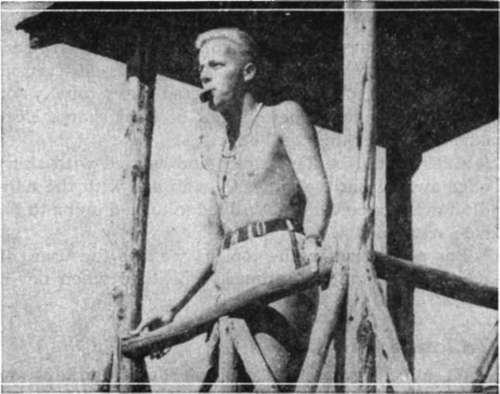
For safe swimming there should be a minimum of one pair of watchful eyes for each ten bathers!
Limit the length of swim periods to thirty minutes and the number to two each day.
Avoid high diving and deep diving.
Scouts known to have sinus or ear trouble should not go under water except with permission of family doctor. Impress on all boys the danger of sinus infection resulting from pressure when they jump into water feet first without holding the nose.
Visitors should not be permitted to swim unless they have had a physical examination and swimming test.
Make sure that a well-equipped First Aid Kit is at the waterfront.
Guns
Never permit guns to be carried on Troop trips.
Knives And Axes
Pocket knives, if kept sharp, will render every service necessary to a Scout. Belt knives, if carried, should be in properly constructed cases, always in back of hip joint. They should be kept sharp. Keen edges are safer than dull edges.
Axes should be kept sharp and carried with sharp edge away from the body. Pass an axe with the handle toward receiver and with edge turned up or to the side, never down.
For protection to the tool as well as the user, all edge tools should be properly sheathed when not in use.
Inflammable Liquids
Gasoline, kerosene or coal oil should be kept and distributed only by an authorized leader. Cans containing gasoline should be painted red to distinguish them from kerosene or oil. Gasoline should never be used for firemaking. For cleaning purposes it should not be used within fifty feet of a fire and then only in the open.
Hiking On Highways
For hike safety, see Chat 28 on "Hiking."
Sunburn
Exposure to the sun would be of short duration at first, a few minutes at a time. Grease paint, vinegar, sunburn lotions, and crude oil help to prevent a bad burn.
When the Stomach Aches, Give No Laxatives
If a Scout develops abdominal pain, he must not be given a laxative. That pain may be a warning of an appendix condition which might rupture if laxatives are used. The Scout should be examined by a doctor without delay.
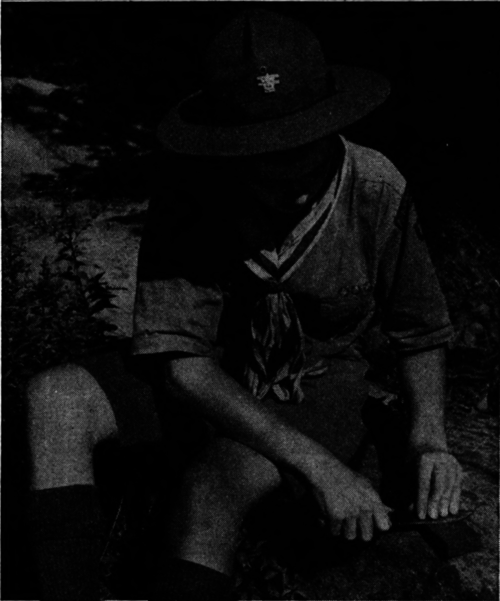
Knives should be kept sharp. This Scout has learned how to keep his knife sharp and how to use it in the proper manner.
Fruit and roughage in the diet should be sufficient to bring about proper bowel action.
Seven Points Of Fire Safety
1. Always secure permission in advance from proper authorities for lighting fires.
2. Clear a big space of at least ten feet in diameter before lighting a fire.
3. Never light a fire when a wind storm is in progress.
4. Never leave your camp fire for a minute. This is a serious offense, in several states punishable by fine and imprisonment.
5. Put out your fire "twice"—and thoroughly. Put it out first entirely with water and then cover over with earth—not leaf mould. Hot rocks sometimes rekindle a fire put out with water alone. Covering with earth afterwards is the only sure method.
6. Evening camp fires should be small, not large bonfires. Observe strictly the above rules. The evening camp fire should be put out under the personal supervision of the Scoutmaster.
7. Forest fires should be immediately reported to the nearest local authorities. It is advisable to give the boys an early training in fire fighting.
Suggested by Verdugo Hills Council, Glendale, Cal.
Fire
Scouts should be instructed in the proper places and methods for building fires, extinguishing them, and utilizing them without hazard.
All camps should be provided with adequate fire fighting equipment, including extinguishers, fire pails, brooms for beating, rakes, bush axes, shovels, and, when possible, hose with a high pressure water supply. Mobile units should be maintained for ease of transportation to place of fire.
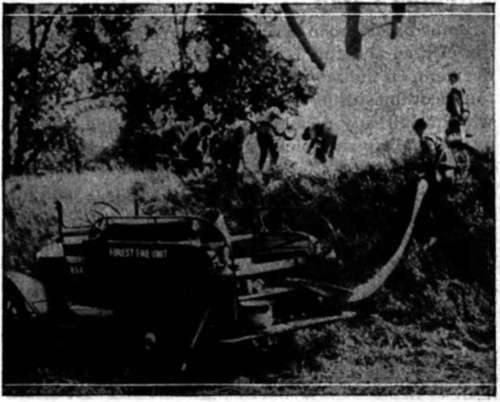
Some careless person started this fire. These Scouts in their fire truck have it under control and are learning conservation.
Scouts should be trained in simple fire fighting technique, but prevention should be stressed.
Starting The Camp
Finally comes the big day. All preparations have been completed, all equipment is at hand. The Scouts have gathered, all packed, ready to be off. Into the cars or onto the busses or the trains. And off you go, with high expectations for what is in store!
Your journey should be so planned that the Troop will arrive on its camp site in the early afternoon, so that there are still several hours of daylight in which to get the camp established.
At last you get there. And the busiest time of the whole experience is at hand: Pitching camp.
Pitching Camp
Immediately upon arrival the Patrols establish their duffel line, and the Troop Leaders' Council meets to decide upon the set-up of the camp. Led by the Assistant Scoutmaster in charge of Physical Arrangements, who has already developed a tentative plan, they go over the camp site, pick Patrol spots and decide upon other features.
After this quick survey, the Patrol Leaders call their Patrols and everybody gets to work.
The Patrol spots should provide for space for the tents and for the building of a Patrol kitchen further in the background. The most level ground should have been picked.
The Patrols may put up their tents in any design they desire. The Patrols should be a couple of hundred feet apart so that they may feel themselves as units in the cooperative camp. The process of erecting the Patrol camp is described in full detail in the Handbook for Patrol Leaders.
The Scouters and the junior leaders together will put up the leaders' tents. These should preferably be situated near the entrance to the camp and easy of access for all members of the Troop. Following these tents the store tent should be erected and the staples brought from home arranged.
In the meantime a group consisting of one volunteer from each Patrol digs the latrine on a location down stream and down slope from the entire camp, certainly below the drinking water supply. It should be at least one hundred feet from the cooking and eating places. Locate the latrine as nearly as possible the same distance from the different Patrols.
On a suitable spot in the middle of the camp a flag pole is raised with pulley and line, for The Flag of the
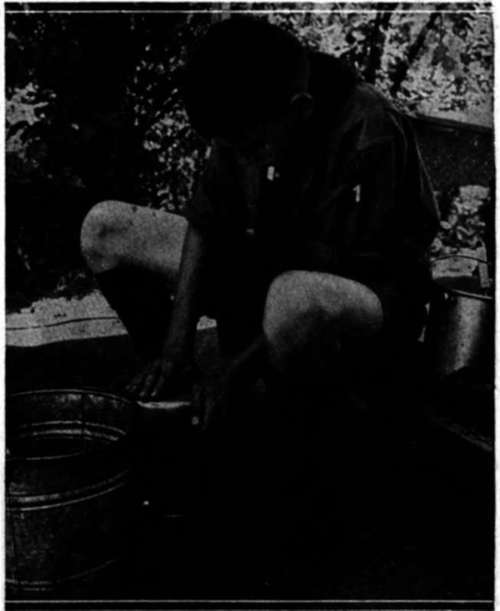
Some camp directors make "clean-up" a game. Don't let it become drudgery. Put pep into the Scouts by making it a Patrol contest.
United States and the Troop flag. They may be hoisted immediately with or without ceremony as desired.
Also lay out a Camp Fire Circle about thirty feet in diameter and arrange log seats around it if possible. If a shelter tent has been brought along for the complete Troop, this is next erected.
First Meals
As soon as the Patrols have established their fire places the foods for the first meals in camp are given out, so that the cooking may be started promptly.
When refrigerators are dug or constructed as evaporating devices and hung up, and Patrol commissary boxes put up, the rest of the food stuffs for the afternoon delivery (breakfast and lunch supplies) should be distributed. With the food stuff, should go a complete list of the intended menus, and of the foods provided, and full instruction for the preparation of the meals. (See suggested menus, food lists, and recipes earlier in this Chat.)
The First Camp Fire
While the Patrols are busy, the junior leaders collect wood and arrange for the evening's camp fire. The program may contain a few familiar songs, but the main feature will be the brief Scoutmaster's talk about "How we can make our camp a success."
This talk should refresh in the boys' minds the things they have practiced on hikes and in short-term camps as training for their summer experience. It should challenge the Scouts to make the most of every day starting immediately. The talk might include many of the following thoughts—all of which should have been well established in the Scouts even before they arrived at camp.
Tell the boys about the test of the real Scout camp. That everybody cooperates; that the Scout Law is the only rule and regulation necessary; that the camp site is scrupulously clean; that all orders for the mutual benefit are obeyed immediately and cheerfully.
Tell them that you are concerned about their health and safety. That swimming is only done during regular swimming hours; that axes must be handled so that there is no danger of anybody being hurt; that fires must be carefully watched and fire alarm given if any danger is apparent; that even the slightest scratch must immediately have first aid attention; that anybody who does not feel well should immediately come to the Scoutmaster; that daily bowel movements are absolutely necessary for health and that irregularity should be reported.
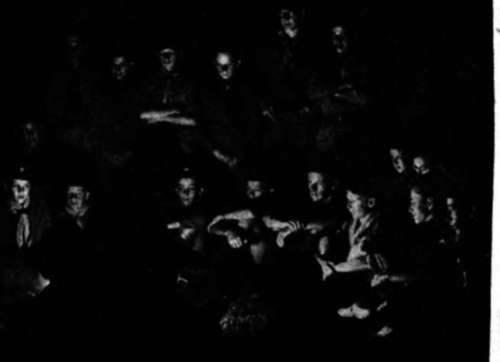
Many traditions are established around camp fires. Many larger views of life are visioned. Lasting friendships are made.
Tell them that the camp is theirs. That the general tidiness and special responsibilities will be in the hands of a Service Patrol under the supervision of the Assistant Scoutmaster in charge of Physical Arrangements; that the program of the day will be handled by a Program Patrol, under the Assistant Scoutmaster in charge of Activities. Describe the duties of these special Patrols as given on the following page, and have the Patrols draw lots for their first turns, so that the rotation between the Patrols may be worked out and placed on the bulletin board the next day. Present to the Patrols chosen by lot a copy of their responsibilities.
Continue to:


